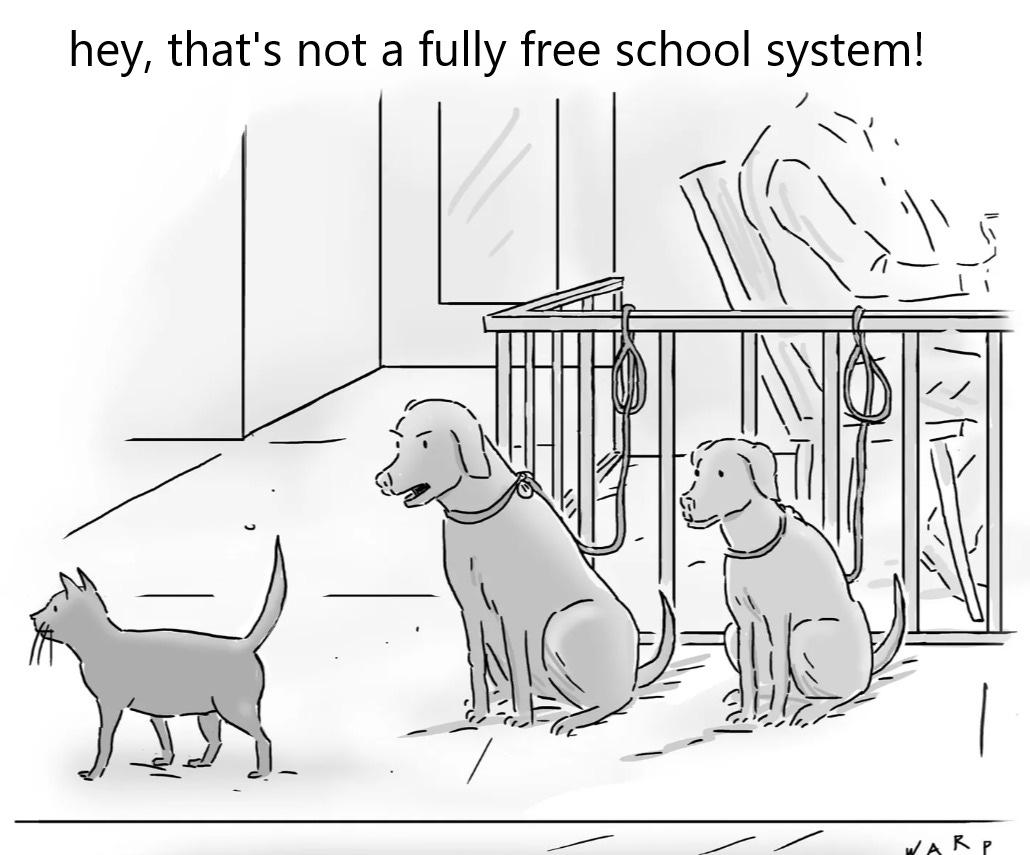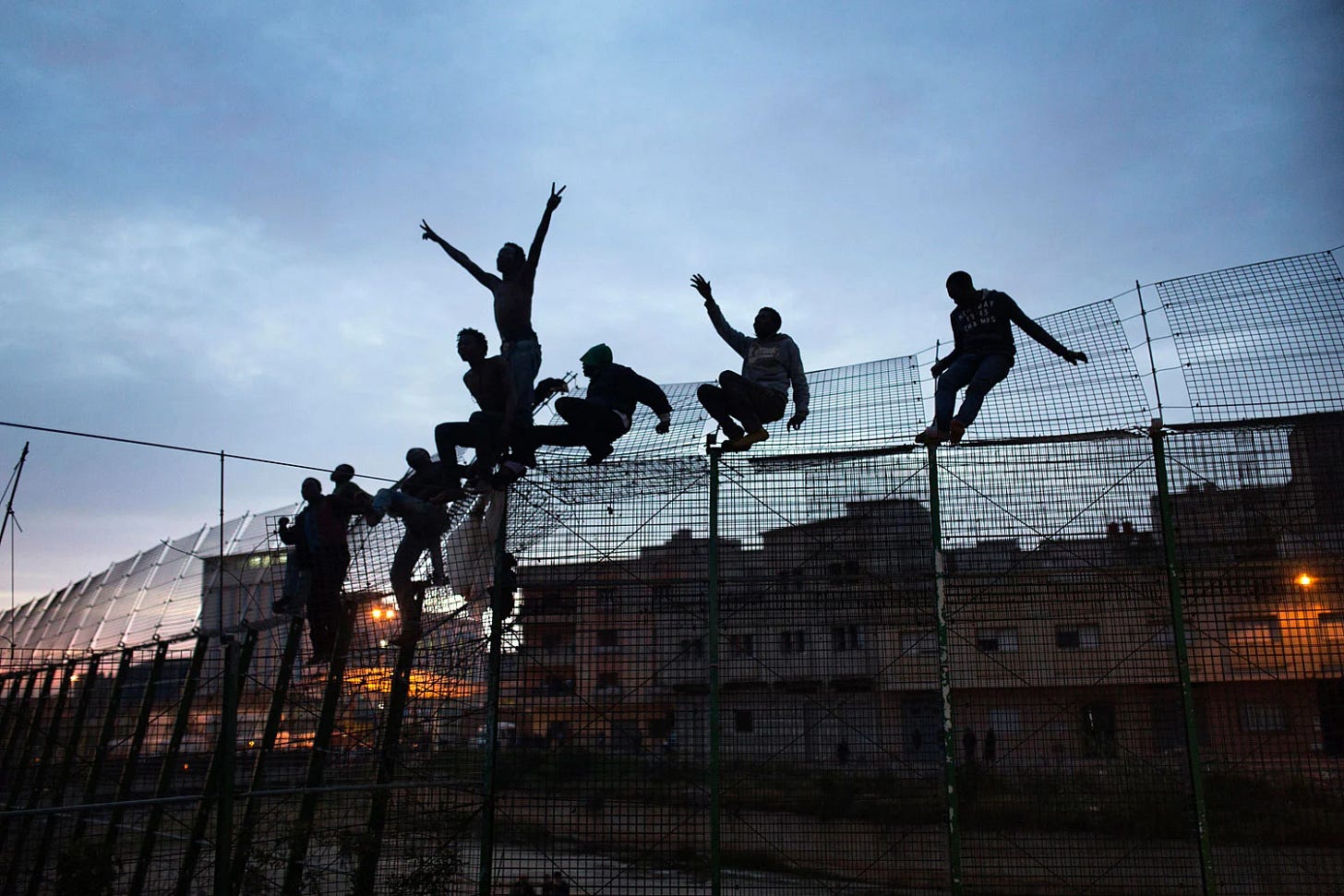what should schools teach part 2: key questions and trade offs
why funding students not systems is the best choice for today and how it sets up the best tomorrow
this is a companion piece to the earlier school choice article. if you have not, you should read that first.
as we left the last piece, i was thinking this:
OK, i can already hear the howls warming up, so let me see if i can address some common complaints without veering into straw men, but as we do so, let’s keep one very simple thing in mind:
no system or solution is perfect.
“here’s a bad thing that could happen” is not a dispositive argument.
we’re talking about weighing drawbacks vs benefits and like all allocation of scarce resources:
it all comes down to trade offs.
OK. so what are the drawbacks?
a common libertarian argument against funding student goes like this:
it’s still state involvement. we’re letting them tax us and take money and allocate it to a purpose. that is coercive and there is no way to know if this level is anything like efficient or market clearing or if we should even have state sponsored education at all.
yup. this is absolutely true. it’s a purist libertarian objection rooted in notions of pareto optimality. and it’s almost certainly correct. you would, over time, almost certainly get a better, more efficient, and more effective system if you allowed education to simply emerge, especially in a time like today when online courses and collaboration is so widespread. i don’t think i could refute this point and am far from sure i’d even want to. it’s a problem.
but we have to view it as a trade off. if we demand to adhere to this purist doctrine, what happens? nothing.
we’re stuck with the system we have. you’re simply not going to sell “no more public schools or school funding” to the middle of the american political spectrum and you cannot just “start there.” it’s like asking 13th century agrarian serfs to jump straight to the information age. it can’t be done. the infrastructure is not there and neither is the mindset. it’s too much too fast. even if you could sell it, the disruption would be too vast. if one would seek such a goal (and we probably should), interstitial steps are required. and i think vouchers are the first step.
we need to stop letting the perfect be the enemy of the better.
people will do stupid things. they’ll send their kids to schools that teach (insert thing i hate here) and that do not teach (insert hobbyhorse here)! they’ll homeschool kids that think buttons on sweaters are the work of the devil or that race based gender communism is the basis of all human civilization.
yup. maybe they will, but this is nothing like the argument it sounds like at first pass because it too ignores trade offs. first, as unfashionable as it is to say, we must accept one simple fact: there is real room for intelligent, well intentioned people to disagree about what children should learn. what looks like failure to you might be someone else’s (quite valid) happy place.
different strokes for different folks. what might look like a problem to you might be someone else’s solution.
no one has a monopoly on being right and having your parents fight tooth and claw to teach you one thing while schools do the same to teach another is not a good environment for children. something always breaks. and it’s usually the child.
and what’s the alternative? the minute we create some “accreditation board” for allowable school spending, we’ve lost the game again and surrendered the framing of “what may the children be taught?” back to the state by creating a new commanding heights of educational control and guild erection. you’ve just ceded control to a different group of even less accountable bureaucrats. this seems ill poised to work any better than what we have and could easily wind up worse.
and the benefits are massive. we get diversity in educational offerings, kids can be at schools where they and their families feel comfortable, we can experiment and explore possible educational modalities and systems, and we can learn and change schools.
it’s not like the system we’re giving up is so precious and working so well. it’s not like schools aren’t teaching lots of things right now that lots of people hate but have no say in.
so give them a say, give them a choice.
you make your choice and maybe stop worrying so much about the choices other people are making and focus on your own.
the price of your freedom is the freedom of others to do stuff you might disapprove of.
they’ll steal the money and do shady deals with schools that kick back cash or they’ll pretend to homeschool and spend it on drugs or large screen TV’s.
sure, some parents may game this system and choose schools that flout intent or home schooling systems that “come with a free trip to hawaii” but consider what it’s replacing. how many kids today go to schools that are unsafe, teach next to nothing, and just churn through class after class that cannot read at anything like grade, much less adult level, do basic math, or are prepared for or even interested in the subject matter? the money here stays the same, but i have serious doubts that the number of “not being educated in any meaningful or successful fashion” kids will rise under vouchers. i’ll bet it drops like a stone, especially as the offerings themselves will get so much better and parents will stop being trapped.
and for the really edge cases of outright misbehavior, we have have an ombudsman to whom the children themselves can complain, demand control over their own educational choices (or to appoint a guardian if they are too young) and cut the worst of the worst out of the system.
of course, it won’t be perfect. some will find ways to act badly. but is that really any different to now and are a few parents plundering a system worse than what teachers unions do today?
but the teachers might not be any good. how can we know without credentials?
i went to one of the best high schools in the US. it was a boarding school. we probably sent 30% of our grads to ivies or near ivies. we had incredible teachers. truly dazzling, interesting, effective people. you know what the credentialing requirement was for them? zilch. nothing. nada. they were chosen for their ability to teach. nothing more, nothing less. i had a philosophy teacher who was a self-educated sicilian immigrant who taught himself out of the new york city public library. he was astonishing, insightful, and one of the most engaging instructors of anything i have ever had. i still remember some of his lectures word for word.
no public school would have or could have taken him.
how can we know that credentials mean anything? how many bad chair-filler deadwood deadmind teachers are out there slowly turning coffee into pensions and teaching nothing? how can we even know when they refuse any and all attempts at assessment or merit based pay?
credentialing is a disaster that forces useless expense of time and money to push teachers through needless education and degrees. it weeds out many of the best and makes the financial proposition stink. it also creates a new vector of state control. control the credentials, control who gets to teach. control who gets to teach, control what gets taught.
there is zero case for mandatory teacher credentials. measure performance instead. if parents and students care about credentials, voluntary credentialing authorities like ISO will emerge and provide them. there is no need to require it. but at the end of the day, i’ll bet they don’t. parents care about the quality of the education and most of the best schools are taught by teachers that would not qualify to teach public school. this is not about quality assurance, it’s about guild systems.
parents don’t know what a good school is/is supposed to look like and will make bad choices.
the idea that parents don’t know what a good school is is both near entirely false and almost meaningless and “oh my god you could never let THOSE people pick a school” is a patronizing and dismissive position to adopt.
also keep in mind that their choices about “what does a good school look like” don’t need to be perfect. they are not competing with some platonic form of base case, they’re competing with randi weingarten and her merry band of terminally tenured union kleptocrats who excel at nothing so much as demanding ever more money with ever less accountability.
outperforming that is a bar so low you could trip over it in the dark.
but the truly best part of this is that it will rapidly become almost impossible (without really trying) to make a bad choice.
try buying a bad dishwasher some time. you pretty much can’t. they are all really, really good. you know why? competition. that’s the law of the jungle: “competition breeds competence.”
works for cheetahs and gazelles, works for students and schools.
all schools will need to compete for kids and because they are exposed to consumer sovereignty will be forced to get better. fast. because the other schools will be and those that fail to keep up to rapidly improving standards are not going to last long. and they’ll get taken over by people that DO know how to run a school.
what makes a good school? it’s one to which students want to go and parents want to send them.. period. you decide, they compete to provide what you want.
and kids will have to up their game too. schools will not have to take them. if they are disruptive or fail to do the work, schools can simply say “no thanks.” the hostage situation that pertains today will no longer exist. and the benefit to the rest of the kids who just want to learn will be vast.
but the real the grand benefit here will be both specialization and optimization. you’ll get general schools, science academies, arts and performing arts schools, schools for math, schools for engineering and computers and for skilled trades.
the classic high school is just not a great fit for many kids. they have other interests and desires. and forcing them to be there helps no one. maybe they want to learn to code or to fix cars. maybe they do want a classic run of college preparatory work. maybe they want it but at much higher levels. maybe they just want to apprentice in a skilled trade and classes on how to run a small business, something that damn near no high schools teach in any practical/applied fashion. (which is absurd) we could have schools with intellectual curricula, tactile learning strategies, applied activities, career training, and who knows what else?
we could experiment. we could learn what works and what serves the students and have a real “skin in the game vote with your attendance” mechanism to validate it.
what’s a better use of $60k in spending for high school for a kid that does not want to be there: sitting in class bored and disruptive or learning to be an electrician and accruing money that could be used to start a business when they turn 18?
what benefits them? (and let’s face it, we could use A LOT more skilled tradespeople around here)
but how can this work in small towns with one school and won’t they be at a disadvantage to cities and bigger districts?
well, how does it work now? schools have always varied. some small towns have great schools. some do not. many cities have terrible schools. but the rising tide of competition will lift all boats. it’s not going to make anything worse and even one school towns will have to compete with online learning and with in person programs like tutoring where some enterprising teacher shows up, picks up 10 kids, and teaches them. everyone benefits from the development of sophisticated curricula and teaching techniques going on all over. this obsession with “everyone needs the same outcomes” has held the world back for too long as it is. we could easily make the 20th percentile schools function like the 70th today. if that’s not enough of a win for your town because some other school might get even better, sorry, i don’t know what to tell you. that’s just a crab pot of pulling everyone back into mediocrity (or worse) because you fear that someone else might excel.
but won’t this result in all the really smart and motivated kids going to special schools and the rest of the kids being left out? we need the top achievers to lift the others up.
this one gets trotted out a lot. honestly, i find it to be one of the more dishonest and deeply unethical pieces of the objection set. foremost, there is no evidence that this is true or ever was. classes tend to drop to the level of the slow members, not get pulled up to the level of high achievers and throw in some discipline cases and it really goes to hell. the whole notion appears rooted in a full blown canard but even were the idea that smart kids pull up their classmate true, so what?
what gives you the right to hamstring them and force them to achieve at bellow their potential because it serves you? they are not some sort of communal property to be allocated like serfs to the benefit of classrooms to which they are bound. what gives anyone the right to hold them back to pull others forward? how is that not just flat out achievement communism? i see no basis for this is a free society.
and look, people may feel like this violates their egalitarian sense, but the simple fact is that in the information and high tech age, growth is driven by technological advancement and technological advancement is driven by the “best and brightest.” enabling them enables everyone. yoking thoroughbreds to hay wains is not doing anyone any favors. let them run.
tellingly, this objection tends to come from teachers unions. they push it because top kids pull up test scores and make the schools and districts look good but there is little evidence that these kids are putting up 99th percentile scores because of the schools. these groups are just terrified of what will happen if they have to post the results of just the kids that need teaching and not the top talent with high motivation.
but don’t we need schools to create well rounded people who can better appreciate and navigate life and act as informed participants in democracy?
this is another of these assumptive goals. is this really a thing? does it happen? does it work? and even if it could, who would you trust to provide it? the state? because, sorry but is someone trying to argue that this is what we’re getting right now?
if you want to read a really well done and challenging book that will blow up a lot of your assumptions on education, pick up bryan caplan’s “the case against education” and really read it. this book is only ~400 pages but took me 3 weeks to read because i kept saying “no way” and running off to read the studies it cites. i badly wanted it to be wrong. it’s not. it’s devastating to the case that most of college is anything more than credentialism for the majority of students and makes a similar case for high school.
this idea that 4 year HS serves many students well (or at all) looks far more assumptive than one might suspect. probably something like 1/3 to 1/2 of US HS kids are getting nothing out of it but wasted time and frustration and a couple years after they graduate, they remember nothing. they cannot tell you when the civil war was, how many branches of government there are, or find the US on a map much less do conic sections (not that this comes up much) or remember basic biology. it’s really astounding what a total waste high school turns out to be for a huge number of kids.
we’re just warehousing them at great expense and to no good end. it’s hard to see the point, the benefit, or argue that nearly anything that held their attention would not be an improvement.
so, i’m curious as to what other objections and arguments against school choice people have.
drop them in the comments.
but please as we open this can of worms, let’s keep a few things in mind:
the existing system has no mechanism to self correct. we’re just arguing endlessly over how to make education ever more expensive and ever less accountable. the result is staggering inefficacy. we’re paying porsche prices and getting trabis.
and “we just need to keep this same system but with my guys in charge so they do it right!” is not a real answer. that’s just the “communism will work if we get smarter guys this time” argument.
the current system has no competition except for the top students that can afford to pay a ton for tutelage or win scholarships. it leaves the rest in the stultified torpor of monopolies. it’s not even going nowhere, it’s steadily getting worse. in the information age, our kids are getting less and less informed and more and more subject to nasty forms of self-destructive indoctrination.
how is anyone to trust that? the system lacks the information to provide better results and the incentive to follow that information if it did. schools are terminating successful reading programs because it’s more important to focus on “woke.”
this is the modal outcome and it will not change unless we fundamentally change the system.
public school was designed as a tool for public indoctrination.
and if you leave the power to decide what is taught in the hands of the state, the state will teach you to fear and obey it and divide you against one another that you may be more easily ruled.
it’s “fox academy” teaching the poultry.
make your own judgements on how that’s working out…
i’m honestly curious. red team this for me: how is this not a clearly good and attainable idea? how does this not work out best for everyone except for entrenched teachers unions and the politicians they buy, the DoE, and the authoritarian leaning statists? (and why should we care what they want?)
what is the argument that this should not be front and center political policy and that it does not, at long last, get out of the no win trap of having the state decide what children should be taught? how do the benefits to the kids, to liberty, to society, and to the evolution of america massively outweigh any problems?
how is this not the path to a system that would be the envy of the world and the future of a free people?











Public schools are failing. I was able to protect my kids during Covid in a top ranked private, conservative Christian school that stayed open, without forced masking, in person since mid August 2020, and the school demands excellence.
It’s not unfair we can afford it and others can’t. It’s unfair parents who protect their kids pay twice and it’s unfair the system blocks families who can’t afford to pay twice from deciding how to spend the funding purported to be for their kids’ education. The outcome is trapping most of the vast middle in failing schools (though parents are finding ways out). It’s unfair that so many kids were so unnecessarily damaged. The world would not be better off if only more kids were more damaged in the name of “fairness.”
School choice is the civil rights issue of our time. As a society we are going to fund education in some manner, no matter how much that irritates the libertarians. Solutions aren’t found in ideological fantasies. The funding is there, children are living humans who don’t have decades for trial and error, the solutions are evident, and progress is really as simple as a law change.
The guardrails are also simple - like the cash for school, the guardrails follow the kids. Every other year kids not tested in their schooling choice should have to take a standardized tests for basic skills in reading, writing, arithmetic. If the child is highly deficient in demonstrated skills, not subject matter curriculums but demonstrated skills, two tests in a row then the child’s school money must go to a school where a majority of students are proficient. No accrediting individual schools or necessary, nor is some state written curriculums guidance. But it is fair to have guardrails on skill sets that are assessed at the student level.
I love these two pieces. As a mother to an 11 year old I’m completely on board. Have been reading people like John Taylor Gatto for years. It’s clear how utterly bankrupt the system is. The things that “aren’t working” actually are working. They’re features, not bugs.
Let families decide what works for our children. The vast majority of parents of all income and educational levels are capable of making good choices for our children.